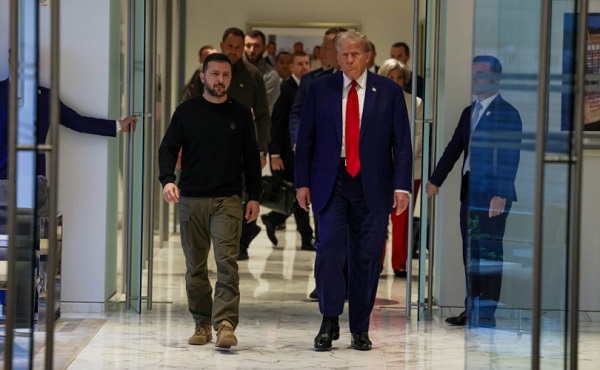conflict
Trump’s election victory shows the American people want peace in Ukraine

From LifeSiteNews
By Bob Marshall
Americans resolutely rejected Kamala Harris’s war policies, electing Donald Trump on a platform of de-escalation. Joe Biden’s late delegation of missile control to President Zelensky and $24 billion funding serves only to deepen global conflict and risk elevation to WWIII
On November 5, 2024, American voters rendered their verdicts on several important questions where Donald Trump and Kamala Harris had polar opposite policies. The Russia-Ukraine war was one of them.
- In September, Trump said, “I want the war to stop. I want to save lives that are being uselessly killed by the millions…. It’s so much worse than the numbers that you’re getting.”
- Harris, after having opposed a peace agreement worked out between Ukraine and Russia in 2022, said in late September, “I will work to ensure Ukraine prevails in this war.”
- Harris, who reminded us constantly that “democracy [was] on the ballot” here in the United States, seemed to care not a bit that Ukrainian President Volodymyr Zelensky had canceled Ukraine’s elections, perhaps in a bid to avoid his own voters. Further, in a Gallup poll of Ukraine, conducted in August and October 2024, “an average of 52% of Ukrainians would like to see their country negotiate an end to the war as soon as possible. Nearly four in 10 Ukrainians (38%) believe their country should keep fighting until victory.”
When many millions of Americans and Ukrainians clearly want peace, and neither Joe Biden nor Kamala Harris can define “victory,” what are we to make of Joe Biden’s two, giant, post-election steps toward expanding the war into Russia proper and central Europe?
- Step 1) Initiating unprecedented direct missile strikes on Russia: Biden took the first step on November 17, 2024, when he (or his handlers) delegated his authority over targeting U.S. ATACMS long-range missile batteries in Ukraine to Volodymyr Zelensky. Not only did Biden authorize Zelensky to select targets inside the Russian Federation, he also authorized Zelensky to have virtual command and control through U.S. military and civilian personnel who are the only military forces capable of firing these missiles and using NATO/U.S. satellites to guide them to the Russian and North Korean facilities, soldiers, and civilians Zelensky wanted destroyed or killed!
- Step 2) Asking Congress to write Biden another Ukraine war check: President Biden wants a Supplemental Appropriations of $24 billion for Ukraine before he leaves office on January 20, 2025. Speaker Mike Johnson (R-LA) wisely refused to permit a lame-duck Congress to authorize Biden and Zelensky to continue the war into 2025 in an effort to box in or block Trump from ending it, because until noon on January 20, 2025, when Donald Trump takes office, he has no formal veto powers – all Trump has is the moral authority to call the nation to its senses.
With most of official Washington focused on the transition, the president-elect’s appointments, and the drama of confirmation battles in the Senate, now is a good time to reflect on some basic truths about the defense of our homeland against invasions and attacks by enemies, both foreign and domestic.
For good or for ill, significant portions of this struggle over whether officially Washington and London want a “hot” war with Russia will be played out in the congressional budget process during the deliberations of any future appropriations bills, made all the dicier because of the micrometer-slim Republican majority in the House, where, “All Bills for raising Revenue shall originate in the House of Representatives” (U.S. Constitution, Article I, Section 7, Clause 1).
And remember, Republican and Democratic House and Senate war hawks, as well as their civilian supporters, campaign donors, weapons’ manufacturers providing local jobs in 70-plus U.S. cities, leftist media harpies, and the legions of “Never Trumpers” have not disappeared. So, concern over Ukraine war funding still applies to any future appropriations for Ukraine after January 20, 2025.
- On November 19, following Biden’s delegation of authority to Zelensky to command U.S. troops to target Russian territory, “President Vladimir Putin … formally lowered the threshold for Russia’s use of its nuclear weapons … [that] allows for a potential nuclear response by Moscow even to a conventional attack on Russia by any nation that is supported by a nuclear power.”
- On November 29, Hungarian Defense Minister Kristof Szalay-Bobrovniczky stated, “Until the inauguration of the U.S. president on January 20, we will go through the most dangerous period in the Russia-Ukraine war that has been going on for nearly three years now.” Hungary is a NATO member.
In electing Trump, Americans also voted resoundingly for aggressive defense of the homeland. They will not tolerate continued invasions and attacks on our people and infrastructure by foreign nationals, organized criminal gangs, border jumpers, and terrorists. Russians and Ukrainians have the same rights to self-defense and self-determination. We know exactly what Americans would think if our homeland, territories, or military installations were threatened or attacked by Russia’s or any other hostile power’s missiles based in Cuba, Mexico, or overseas. We would either respond in kind or at least seriously and convincingly warn of equal repercussions.
Donald Trump Jr. “gets it.” Last month, the president-elect’s son posted on X:
The Military Industrial Complex seems to want to make sure they get World War 3 going before my father has a chance to create peace and save lives. Gotta lock in those $Trillions. Life be damned!!! Imbeciles!
And, right on cue to prove his point, some current NATO advisors are urging that President Biden give the Zelensky administration nuclear weapons. Several NATO officials “suggested that Mr. Biden could return nuclear weapons to Ukraine that were taken from it after the fall of the Soviet Union. That would be an instant and enormous deterrent. But such a step would be complicated and have serious implications.”
Kremlin spokesman Dmitri Peskov responded, “These are absolutely irresponsible arguments of people who have a poor understanding of reality and who do not feel a shred of responsibility when making such statements. We also note that all of these statements are anonymous.”
This article is reprinted with permission from the Family Research Council, publishers of The Washington Stand at washingtonstand.com.
Artificial Intelligence
AI Drone ‘Swarms’ Unleashed On Ukraine Battlefields, Marking New Era Of Warfare


From the Daily Caller News Foundation
Artificial intelligence-powered drones are making their first appearances on the battlefield in the Russia-Ukraine war as warfare creeps closer to full automation.
In bombardments on Russian targets in the past year, Ukrainian drones acting in concert were able to independently determine where to strike without human input.
It’s the first battlefield use of AI “swarm” technology in a real-world environment, a senior Ukrainian official and Swarmer, the company who makes the software, told the Wall Street Journal in a Tuesday report. While drones have increasingly defined modern battlefields, swarms until now had been confined to testing rather than combat.
“You set the target and the drones do the rest,” Swarmer Chief Executive Serhii Kupriienko told the WSJ. “They work together, they adapt.”
So far, the Swarmer technology has been used hundreds of times to target Russia assets, but was first used a year ago to lay mines on the front, the Ukrainian official told the WSJ. The software has been tested with up to 25 drones at once, but is usually utilized with only three.
Kupriienko told the WSJ that he was preparing to test up to 100 drones at once with the linking software.
A common arrangement used on the battlefield includes one reconnaissance drone to scout out the target and two explosive drones delivering the payload on target, the official told the WSJ.
While Western nations such as the U.S., France and the United Kingdom are also pursuing drone swarm technology, they have not deployed swarm technology on the battlefield the way Ukraine has, according to the WSJ. Currently, autonomous weapons are not regulated by any international authority or binding agreement, but ethical concerns around the technology has led many to call for increased regulation of weapons like the Swarmer system.
The Ukrainian Ministry of Foreign Affairs did not immediately respond to the Daily Caller News Foundation’s request for comment.
conflict
Trump Pentagon Reportedly Blocking Ukraine From Firing Western Missiles Deep Into Russia


From the Daily Caller News Foundation
The Department of Defense has spent months blocking the Ukrainian military from using American and British-made missiles to hit targets deep inside Russia, The Wall Street Journal reported Sunday, citing unnamed U.S. officials.
Undersecretary of Defense for Policy Eldridge Colby reportedly designed the procedure to review requests to carry out the long-range strikes with weapons that are either of U.S. origin or that require American intelligence or use components provided by the U.S., according to the WSJ. Secretary of Defense Pete Hegseth reportedly has the final say on whether Ukrainian forces can use the MGM-140 ATACMS (Army Tactical Missile System) to hit targets in Russia.
The reported blocks on missile strikes coincides with a Trump administration effort to broker a peace deal between Russia and Ukraine. A Pentagon spokesperson declined to comment further on the matter.
BREAKING: President Vladimir Putin reacts to B-2 Flyover pic.twitter.com/1mzVn7DxlW
— Jack Poso 🇺🇸 (@JackPosobiec) August 15, 2025
The Biden administration allowed Ukraine to carry out strikes with ATACMS in November, weeks after President Donald Trump won the 2024 election, the New York Times reported. Trump criticized the move during a December interview with Time magazine.
“It’s crazy what’s taking place. It’s crazy,” Trump said. “I disagree very vehemently with sending missiles hundreds of miles into Russia. Why are we doing that? We’re just escalating this war and making it worse. That should not have been allowed to be done.”
Trump and Russian President Vladimir Putin met in Alaska on Aug. 15 for a summit meeting during which Trump sought to secure a cease-fire in Russia’s war with Ukraine. As Trump greeted Putin, a B-2A Spirit stealth bomber and several fighters carried out a flyover of Elmendorf Air Force Base.
Trump met with Ukrainian President Volodymyr Zelensky and major European leaders on Aug. 18 to update them on the summit.
In July, Trump reached an agreement with NATO where members of the alliance would purchase weapons, including MIM-104 Patriot surface-to-air missiles, and donate them to Ukraine.
-

 Business20 hours ago
Business20 hours agoWhy Does Canada “Lead” the World in Funding Racist Indoctrination?
-

 Focal Points2 days ago
Focal Points2 days agoPharma Bombshell: President Trump Orders Complete Childhood Vaccine Schedule Review
-

 Automotive1 day ago
Automotive1 day agoTrump Deals Biden’s EV Dreams A Death Blow
-

 Censorship Industrial Complex2 days ago
Censorship Industrial Complex2 days agoFrances Widdowson’s Arrest Should Alarm Every Canadian
-

 Alberta2 days ago
Alberta2 days agoPremier Smith: Canadians support agreement between Alberta and Ottawa and the major economic opportunities it could unlock for the benefit of all
-

 Automotive1 day ago
Automotive1 day agoCanada’s EV Mandate Is Running On Empty
-

 Alberta2 days ago
Alberta2 days agoA Memorandum of Understanding that no Canadian can understand
-

 Opinion2 days ago
Opinion2 days agoCountry music star Paul Brandt asks Parliament to toughen laws against child porn









